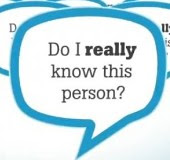 A resume is a carefully self-selected presentation of relevant data that casts you in the best possible light. There’s a reason job interviews exist, rather than hiring candidates on the spot based on their resume: the employer wants a chance to independently verify the first impressions they’ve received from the resume, cover letter, and any other communications with a prospective employee.
A resume is a carefully self-selected presentation of relevant data that casts you in the best possible light. There’s a reason job interviews exist, rather than hiring candidates on the spot based on their resume: the employer wants a chance to independently verify the first impressions they’ve received from the resume, cover letter, and any other communications with a prospective employee.
But while an interview provides enhanced detail in the form of nonverbal cues, body language, personality, spontaneity, performance under pressure, and the answers given for any number of questions the hiring manager has prepared, many employers choose to go a step further and perform a background check on potential employees.
This is especially true in jobs that put an extra premium on physical safety (like mining or trucking), confidentiality or trade secrets, public image (any political job), or responsibility for minors (like teaching or daycare). While most job-seekers aren’t applying to work someplace with a truly intense standard of scrutiny, such as the FBI, it’s still worth asking yourself: if they dig into my record, what are they going to find?
It helps to know a little bit about how this research is conducted. There are different levels of thoroughness, ranging from the most basic due diligence to some real heavy detective work. At the lightest level, a conscientious employer will do the bare minimum of calling former employers and whoever else you’ve got listed as references (though you might be surprised how many of them don’t bother). This is a good reason not to burn bridges with the people you have worked for, even if you have to leave a job under strained circumstances.
The next step would be to check your credit history. There’s a law governing what employers can do in this regard, called the Fair Credit Reporting Act or FRCA. It requires that you be given a written form so you can sign off and give them permission to do a credit check. This is a piece of paperwork that’s probably handed to you at the interview itself. In that setting, you’re probably nervous and have a lot of other things on your mind, so consider this your warning beforehand. If you’re currently unemployed, one good thing to do with all that free time is check up on your own credit. Just don’t get suckered into subscribing to some other product as many supposedly “free” credit reports will have you do. There are various measures you can take to improve your credit, and you want to make sure you’re not being penalized for some kind of fixable error.
Aside from having you take a urine test to see what you’ve been smoking, the next and generally highest level of scrutiny would be a government records search. Your criminal record, any past bankruptcies, your driving record...all these are publicly accessible government documents. Laws vary from state to state on what information an employer can use to judge your fitness for employment; there’s often a statute of limitations so that they can’t judge you for what you’ve done beyond a certain horizon of years.
Unless you really are applying for a job with a government security clearance like the CIA (in which case they’ll interview just about anyone they can who knew you), there’s just one final step to the typical employee background check you should be aware of. There are two terrifyingly sophisticated and intrusive new tools whereby anyone who wishes to can learn practically every detail of your life.
They’re called Google and Facebook. There’s no bill yet that protects the right of employees not to have their name entered into a search engine. Make sure you’ve scrubbed any material you can from the Internet, not just visual but verbal, that might cast you in a bad light. Welcome to the new normal here in the mutual surveillance state. It used to be the Stasi had to collect information about East German troublemakers in vast storehouses filled with reams of paper documents. Nowadays, we voluntarily broadcast our dirty laundry and all anyone has to do is tune in. Make sure what you’re putting out there is the best version of yourself!
Familiar with personal information screenings and online background checks, Jane Smith regularly writes about these topics at backgroundcheck.org. Feel free to send her comments at janesmith161@gmail.com.




